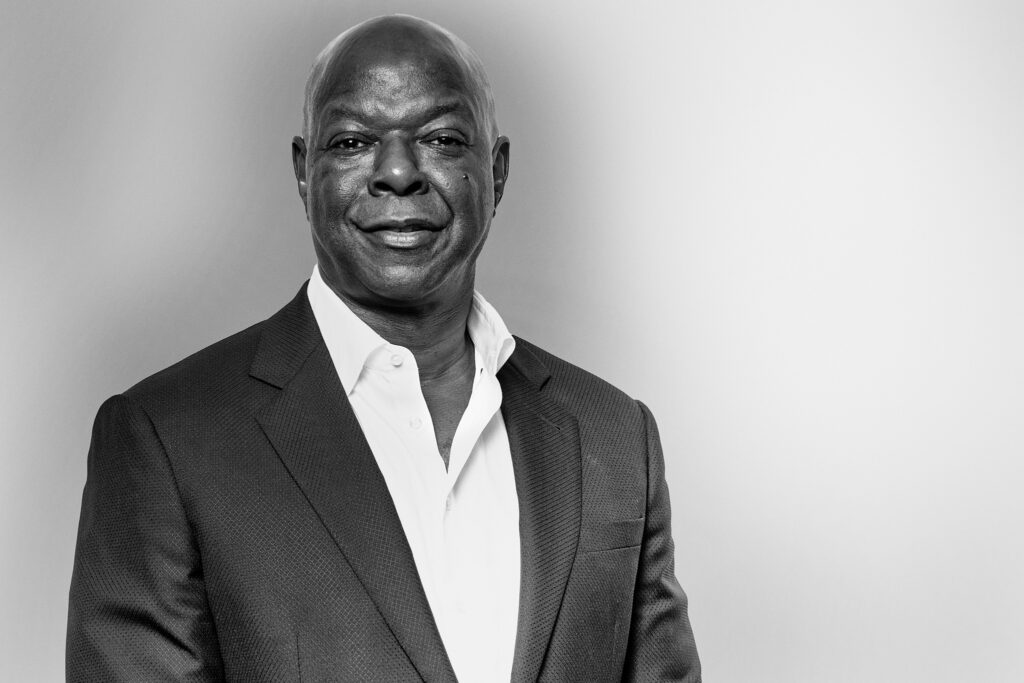Racing Ahead: The 2024 President’s Impact Award

Don Seymour, BBA ’91, says working in asset management is like running a race every day—sometimes you’re so focused on every step that you forget to look up and see how far you’ve come. But perhaps the biggest surprise for Seymour as he raced ahead was a nod from his alma mater. In May, Seymour was honored with the inaugural President’s Impact Award for his unparalleled contributions to the global hedge fund industry.
“I was very shocked,” Seymour says. “It’s one of those things where you still feel that you’re mid-career and you have so much to accomplish … but after it sunk in, I felt very grateful.”
Seymour is modest and soft-spoken, but his 35-year career is dizzying in scope. After graduating from UT with a degree in accounting, the Cayman Islands native went on to serve as the Head of Investment Services for the Cayman Islands Monetary Authority (better known as CIMA). There, he completely restructured the islands’ regulatory framework to make it the leading jurisdiction for offshore investment funds in only two years. He then left to found Waystone: the first and most successful provider of institutional governance and compliance services for hedge funds worldwide. In 2022, Seymour gained international attention for the $1.3 billion sale of Waystone. And since then, he’s continued to make waves as the founder of the business conglomerate, DMS, and chairman of the asset management firm Black Unicorn.
The President’s Impact Award was unveiled at the Texas Exes’ second annual Longhorn 100 gala in May. The event honors the 100 fastest-growing Longhorn businesses, but the new award was created to also spotlight alumni like Seymour with decades-long track records of success.
Although Seymour is still pursuing milestones ahead, he sat down with the Alcalde to share more about his journey.
What was one of the biggest lessons you took from your time at UT, and how do you think that has contributed to your success today?
UT helped me understand how good you had to be to excel. There were students making perfect scores in their classes, which was insane to me. It taught me that I had to raise my game. It’s not just about who you are relative to your class, but where you are in terms of your global skills and talents. After I got through UT, it gave me the confidence that I could compete against the best people in the world.
What was your “big break” in your career after graduation?
I moved to Price Waterhouse New York [from Dallas] to start my career. I was new to the firm and I didn’t have anyone to go out with for happy hour, so I decided to stay in the office on a Friday evening. I was doing some routine work, and I saw this guy approaching me. He was a senior manager at the firm, and he was visibly upset. I said to him, “What’s going on, are you okay?” He was running the largest job in the office at that point, which was Soros Fund Management, and he said his lead senior just had a medical emergency and had to leave the job … And now, mind you, I’m probably a year and a half in, and I’m not a suitable replacement. But I asked if there was anything I could do to help, and he said, “Do you have time in your schedule?” I had lots of time—I hadn’t actually been assigned to any client yet—so he said, “Grab your passport.” And Saturday morning, I was flying to Curaçao to go work on the Soros Fund.
What was it like being thrust into this initial standout role?
It was this combination of eagerness and feeling overwhelmed. I was sitting in the airport on Saturday morning, and I didn’t even know what a fund was. I was literally picking up USA Today and reading it to see if I could get some information. The client hated me … but this was a really positive experience. In the next four years [working on that fund], I learned a tremendous amount about asset management, structures, and strategies. Which, of course, propelled me to the success that I have today. At the end, [the client] didn’t want me to leave, so that was very fulfilling.
After your initial success with Pricewaterhouse in New York, what made you decide to return home to the Cayman Islands?
I was on my second visa, so I needed to decide whether I wanted to be a U.S. citizen. Kurt Vonnegut talks about how everyone should live in New York at least once but leave before it makes you too hard. And it’s true—at some point you feel you’ve got to move out. CIMA needed to hire someone to develop the regulatory framework for funds in the Cayman Islands, and this was a very attractive opportunity for me. I’m from the Cayman Islands, so that was an advantage. And it was a chance to build something from the ground up. So they hired me, and I did that for about two years. In those two years, [the Cayman Islands] went from not even in the top 10 to the lead jurisdiction.
After leaving CIMA, you went on to found Waystone and DMS Organization. How did you build these enterprises from the ground up, and what does their collective success mean to you now?
When I was at CIMA, I saw that the common thread throughout many of the enforcement actions was improper governance. I decided I was going to retire from CIMA and start a firm focused on governance. No one really took that seriously at the time, but now [Waystone] has 15 offices worldwide, and it’s number one in its category. I’m still involved with the firm even after the sale, which gives me a lot of pride … Today, DMS is in conversations that I know we would not be in if not for the success of Waystone. These are the kind of deals you read about in the Wall Street Journal—I pinch myself sometimes.
How have you continued to give back to the local community in the Cayman Islands, even as your work has become increasingly global?
DMS has two philanthropic priorities, which are education and the elderly. So we have endowed the Joanna Clarke Excellence in Education Award there. Joanna Clarke was actually a schoolteacher of mine. I couldn’t speak until I was 5 years old or more, but this woman who had no formal training in speech therapy took me under her wing and really helped me grow and discover my talent. So we endowed this award in her name, and she was able to participate until her death just a few years ago. We’re also building … the first proper senior care facility of its kind in the Cayman Islands.
What advice would you give to current students?
Critical thinking is the most important skill that you need for your success. It’s not about what you learn, but how you learn. Because you never get an education, you are [continuing] to get one every single day.
This interview has been edited and condensed.









No comments
Be the first one to leave a comment.